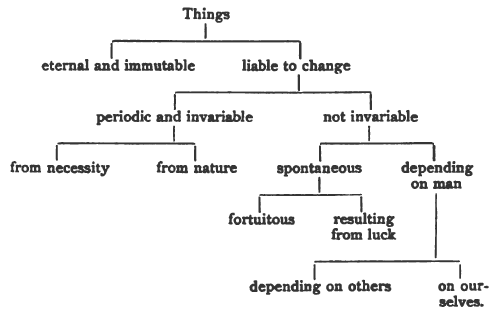In the third section of the third book of The Nicomachean Ethics, Aristotle discusses deliberation.
Deliberation is usually a component of those voluntary acts that are chosen. An exception concerns those chosen acts for which no deliberation is necessary: for example, writing each of the letters involved in signing your name represents a series of chosen acts, but you don’t have to deliberate over these acts because you already know what is involved in forming the letters; it has become automatic.
Aristotle reiterates that we deliberate about means, not ends (which underlines the fact that Book One was a descriptive account of the ultimate ends of human action, not a prescriptive one). Deliberation starts with the intended end in mind, and then decomposes this end into the means that will accomplish it, then, treating these means as ends, decomposes them in turn into the means that will accomplish them, until either one of these means proves to be impossible (in which case the end is abandoned, at least for now) or one proves to be immediately attainable (in which case it becomes the chosen act).
This seems sensible enough, and it appeals to the computer scientist in me. Certain varieties of artificial intelligence algorithms operate in this sort of methodical fashion. This also makes me a little suspicious, though, since such tidy algorithmic processes are often better models for how to make computers behave than they are descriptions of how brains actually behave. But so long as we see it as a model, it strikes me as a good one.

Those things which are liable to change, not in a periodic or invariable way, and that depend on man, particularly on ourselves, are the appropriate objects of deliberation, as shown in this illustration from St. George Stock’s paraphrase ()
Index to the Nicomachean Ethics series
Aristotle’s Nicomachean Ethics
- Introduction
- Book Ⅰ
- Book Ⅱ
- Book Ⅲ
- Book Ⅳ
- Book Ⅴ
- Book Ⅵ
- Book Ⅶ
- Book Ⅷ
- Book Ⅸ
- Book Ⅹ
- Bibliography
